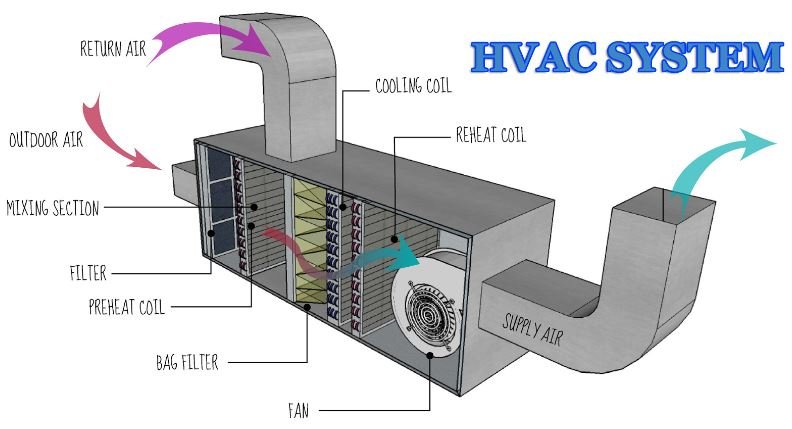Selecting the right ducting supplier for your HVAC (Heating, Ventilation, and Air Conditioning) system is crucial for ensuring the system’s efficiency, performance, and longevity. Here are the key factors to consider when choosing a ducting supplier and the ways in which the right supplier can positively impact your HVAC system.
A reliable ducting supplier not only provides high-quality materials but also offers expert guidance on the most suitable ducting solutions for your specific needs. The right supplier will have a comprehensive understanding of the latest industry standards and innovations, ensuring that your HVAC system operates at peak performance. Additionally, a trusted supplier can assist with custom ducting designs, helping to optimize airflow, reduce energy consumption, and minimize maintenance requirements. By partnering with a knowledgeable supplier, you can avoid common pitfalls such as poor insulation, leakage, and suboptimal airflow, all of which can lead to higher operational costs and a shorter lifespan for your HVAC system.
1. Quality of Materials:
- Importance: The quality of materials used in ducting can significantly affect the performance of the HVAC system. High-quality materials ensure durability, better airflow, and less energy loss.
- Impact: Using substandard materials can lead to frequent repairs, higher energy consumption, and reduced system lifespan. A reputable supplier will provide ducting made from durable materials such as galvanized steel, aluminum, or fiberglass, which resist corrosion and wear.
2. Compliance with Standards:
- Importance: It is vital that the ducting materials and the manufacturing processes comply with industry standards and regulations, such as those set by ASHRAE (American Society of Heating, Refrigerating, and Air-Conditioning Engineers).
- Impact: Compliance ensures safety, reliability, and efficiency. Suppliers adhering to these standards provide assurance that the ducting will perform optimally under various conditions, reducing the risk of system failures.
3. Customization and Flexibility:
- Importance: Every HVAC system may have unique requirements based on the building’s design, size, and specific usage. A good supplier should offer customization options to meet these needs.
- Impact: Custom ducting solutions ensure a perfect fit and optimal performance. Suppliers that can tailor their products to your specific requirements help in avoiding unnecessary modifications and ensure smooth installation.
4. Experience and Reputation:
- Importance: A supplier with extensive experience and a solid reputation is more likely to provide reliable products and services. They are also more likely to have encountered and solved a variety of challenges.
- Impact: Working with an experienced supplier can save time and money. Their expertise can help in selecting the right ducting type, avoiding common pitfalls, and ensuring that the system runs efficiently for a longer period.
5. Technical Support and Customer Service:
- Importance: Good technical support and customer service are essential for addressing any issues that may arise during and after installation.
- Impact: Suppliers that offer strong customer support can provide guidance during the installation process, troubleshoot problems, and offer maintenance tips. This support ensures that any issues are resolved quickly, minimizing downtime and maintaining system efficiency.
6. Cost and Value:
- Importance: While cost is always a factor, it should be weighed against the value offered. This includes the quality of materials, customization options, compliance with standards, and the level of support provided.
- Impact: Opting for the cheapest option may result in higher long-term costs due to frequent repairs and replacements. Investing in a reputable supplier, even if it comes at a higher initial cost, can provide better value through enhanced performance and durability.
7. Environmental Considerations:
- Importance: In today’s world, considering the environmental impact of the materials used is crucial. Eco-friendly ducting options are available and can contribute to sustainability goals.
- Impact: Suppliers that offer environmentally friendly ducting solutions help in reducing the carbon footprint of the HVAC system. This not only benefits the environment but can also lead to energy savings and compliance with green building standards.
Conclusion:
Choosing the right ducting supplier for your HVAC system involves careful consideration of several factors, including material quality, compliance with standards, customization options, supplier reputation, customer support, cost, and environmental impact. The right supplier can enhance the efficiency, reliability, and lifespan of your HVAC system, ultimately leading to better performance, reduced operational costs, and a more comfortable indoor environment. By investing in a reputable and experienced ducting supplier, you ensure that your HVAC system is well-equipped to meet the demands of your building and provide optimal performance over the long term.
Additionally, a thoughtful selection of your ducting supplier can also influence the overall project timeline and budget. Suppliers who offer timely delivery and efficient logistical support can help streamline the installation process, preventing delays and unexpected costs. It’s essential to evaluate not only the immediate benefits but also the long-term advantages of partnering with a supplier who aligns with your project’s goals and requirements. By prioritizing these aspects, you can achieve a more seamless installation experience and ensure that your HVAC system operates at its best, providing consistent comfort and efficiency for years to come.





